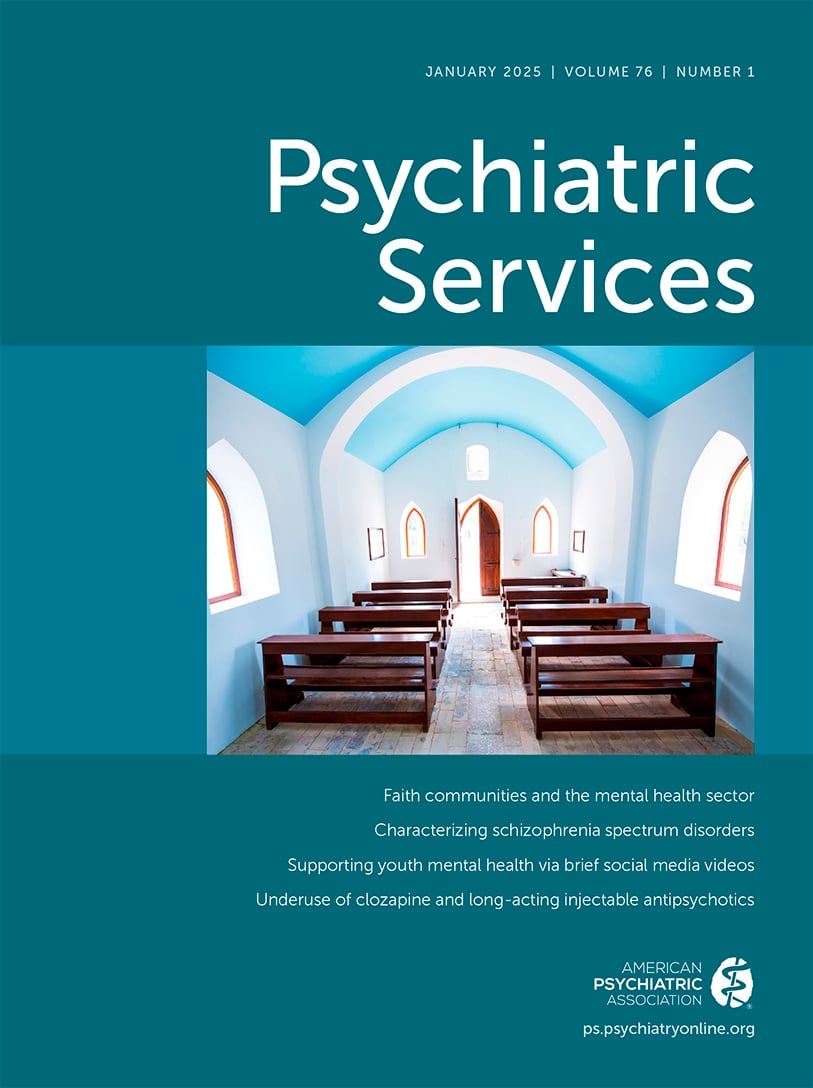Psychiatric Services
- Volume 56
- Number 3
- March 2005
Taking Issue
Departments
Columns
Other Articles
Publication date: 01 March 2005
Pages273–282OBJECTIVES: Expectations in treating schizophrenia are expanding beyond just controlling psychotic symptoms to include functional recovery. This report describes an approach to define and measure the clinical effectiveness of treatment in achieving these ...
https://doi.org/10.1176/appi.ps.56.3.273Publication date: 01 March 2005
Pages283–291OBJECTIVES: This study provided generalizable national data on the treatment of adult patients with schizophrenia in the United States and assessed conformance with the practice guideline treatment recommendations of the Schizophrenia Patient Outcomes ...
https://doi.org/10.1176/appi.ps.56.3.283Publication date: 01 March 2005
Pages292–300OBJECTIVE: In a multisite study, the authors examined the construct validity and utility of a brief self-report Satisfaction With Life scale, an expanded 21-item version of one of the earliest measures of subjective satisfaction with life used with ...
https://doi.org/10.1176/appi.ps.56.3.292Publication date: 01 March 2005
Pages301–307OBJECTIVES: The use of outcome assessment to evaluate the performance of programs over many years of operation is becoming an increasingly important aspect of health care management. Over a five-year period of program monitoring, this study examined ...
https://doi.org/10.1176/appi.ps.56.3.301Publication date: 01 March 2005
Pages308–314OBJECTIVE: This study compared psychiatrists' assessments of their ability to deliver high-quality care with those of other physicians. METHODS: Data were used from the Community Tracking Study Physician Survey, a national survey of 12,528 physicians. ...
https://doi.org/10.1176/appi.ps.56.3.308Publication date: 01 March 2005
Pages315–319OBJECTIVE: The objective of this study was to examine the relationship between subjective perceptions of the quality of housing among mental health consumers and both client characteristics and objective measures of the client's neighborhood. METHODS: A ...
https://doi.org/10.1176/appi.ps.56.3.315Publication date: 01 March 2005
Pages320–323OBJECTIVE: Studies of how differences in systems of care, including cultural differences, affect prescribing practice and patient outcomes are important and can help answer questions such as the effectiveness of clozapine in routine practice. This study ...
https://doi.org/10.1176/appi.ps.56.3.320Publication date: 01 March 2005
Pages324–331This article reviews evidence supporting the need for interventions to promote physical activity among persons with serious mental illness. Principles of designing effective physical activity interventions are discussed along with ways to adapt such ...
https://doi.org/10.1176/appi.ps.56.3.324Publication date: 01 March 2005
Pages332–343OBJECTIVE: Insomnia has high prevalence rates and is associated with significant personal and socioeconomic burden, yet it remains largely underrecognized and inadequately treated. METHODS: A PubMed search for English-language articles covering randomized ...
https://doi.org/10.1176/appi.ps.56.3.332Brief Report
Publication date: 01 March 2005
Pages344–346Failure to keep initial appointments at a community mental health center results in a burden on the staff and the center's financial resources. The authors studied referrals to an outpatient program and found that delay in scheduling appointments had a ...
https://doi.org/10.1176/appi.ps.56.3.344Publication date: 01 March 2005
Pages347–349This chart review study examined identification and treatment of substance misuse on an inpatient psychiatry ward before and after the hospital's administration made changes to increase attention to patients' substance misuse. Before the ward changes, 113 ...
https://doi.org/10.1176/appi.ps.56.3.347Publication date: 01 March 2005
Pages350–352Previous research indicates that most homeless persons with mental illness prefer independent living, while most clinicians recommend group housing. This study compared residential preferences of 141 homeless veterans with dual diagnoses with those of 62 ...
https://doi.org/10.1176/appi.ps.56.3.350Frontline Reports
Letters
Book Reviews
Book Reviews: The Cock and Bull of Augusten Burroughs
Book Reviews
News & Notes
Past Issues
View Issues Archive
Vol. 76 | No. 1

Vol. 75 | No. 12

Vol. 75 | No. 11
